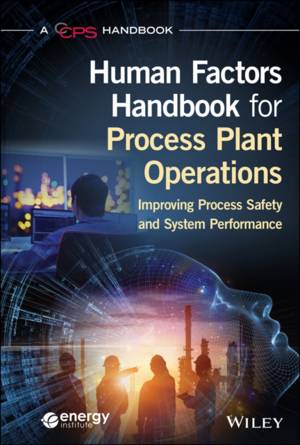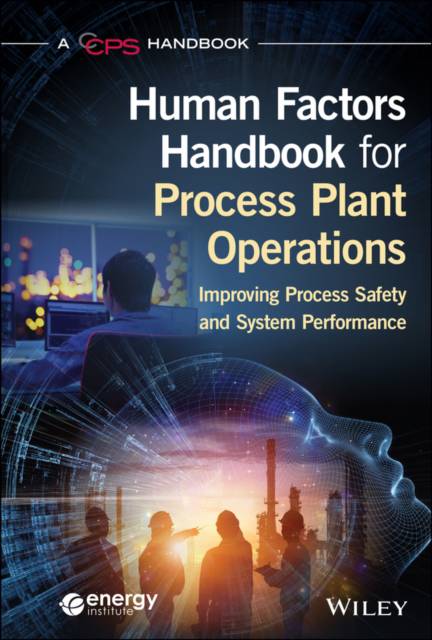
- Retrait gratuit dans votre magasin Club
- 7.000.000 titres dans notre catalogue
- Payer en toute sécurité
- Toujours un magasin près de chez vous
- Retrait gratuit dans votre magasin Club
- 7.000.000 titres dans notre catalogue
- Payer en toute sécurité
- Toujours un magasin près de chez vous
Human Factors Handbook for Process Plant Operations
Improving Process Safety and System Performance
Center for Chemical Process Safety (CCPS)Description
Provides clear and simple instructions for integrating Human Factors principles and practices in the design of processes and work tasks
Human Factors, the science of interaction between humans and other elements of a system, draws from disciplines such as psychology, ergonomics, anthropometrics, and physiology to understand how and why people behave and perform as they do--and how best to support them in performing tasks. The goals of the Human Factors approach are to improve human reliability, minimize the risk from human error, and optimize the working environment, human wellbeing, and overall system performance.
Human Factors Handbook for Process Plant Operations guides supervisors, managers, and engineers on incorporating Human Factors principles and practices into plant maintenance and operations. With thorough and accessible coverage of all Human Factors topics of relevance to process industries, this easy-to-use handbook uses real-world anecdotes and case studies to demonstrate effective training and learning, task planning, communications, emergency response, risk and error management, and more. Throughout the text, the authors offer valuable insights into why people make mistakes while providing advice on how to help workers perform their process operational tasks successfully.
- Explains all essential Human Factors concepts and knowledge with clear descriptions and illustrative examples
- Offers actionable advice and models of good practice that can be applied to design, process operations, start-ups and shut-downs, and maintenance
- Addresses job aids, equipment design, competence, task support, non-technical skills, working with contractors, and managing change
- Discusses how lack of Human Factors considerations during the engineering design phase can adversely affect safety and performance
- Describes how to use indicators to both recognize and learn from human error and performance issues
Written by highly experienced operating and maintenance personnel, Human Factors Handbook for Process Plant Operations is an indispensable resource for everyone involved with defining, planning, training, and managing process operations, maintenance, and emergency response in the food, pharmaceutical, chemical, petroleum, and refining industries.
The missions of both the CCPS and EI include developing and disseminating knowledge, skills and good practices to protect people, the environment, and property by bringing the best knowledge and practices to industry, academia, governments and the public around the world through collective wisdom, tools, training and expertise. The CCPS, an industrial technology alliance of the American Institute of Chemical Engineers (AIChE), has been at the forefront of documenting and sharing important process safety risk assessment methodologies for more than 35 years and has published over 100 books in its process safety guidelines and process safety concept book series. The EI's Technical Work Program addresses the depth and breadth of the energy sector from fuels and fuels distribution to health and safety, sustainability and the environment. The EI program provides cost-effective, value-adding knowledge on key current and future international issues affecting those in the energy sector.
Spécifications
Parties prenantes
- Auteur(s) :
- Editeur:
Contenu
- Nombre de pages :
- 480
- Langue:
- Anglais
Caractéristiques
- EAN:
- 9781119640493
- Date de parution :
- 26-04-22
- Format:
- Livre relié
- Format numérique:
- Genaaid
- Dimensions :
- 147 mm x 218 mm
- Poids :
- 861 g







